The best thing I read all year — 2016
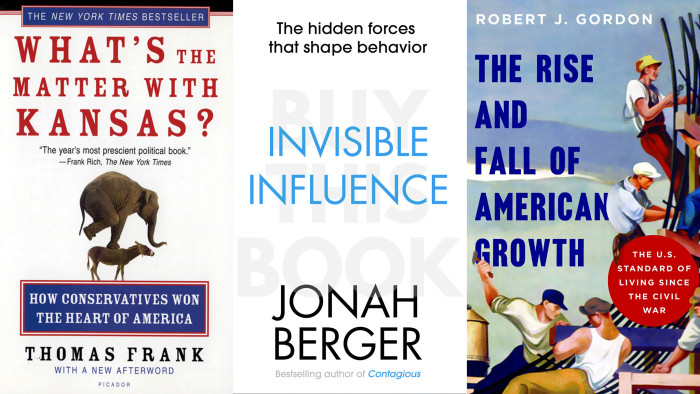
Roula Khalaf, Editor of the FT, selects her favourite stories in this weekly newsletter.
To round off 2016, we asked 10 leading business school professors a question — what is the best thing you have read this year and why? Some said this was such a tumultuous year, they focused on articles over books. Though the overarching theme was material that gives context to what is happening around the world, on both a management and political level.

Marie Taillard, professor of creativity marketing, ESCP Europe
The most thought provoking book for me this year has been Reclaiming Conversation: The Power of Talk in a Digital Age by Sherry Turkle.
My PhD was in linguistics and this led me to the study of conversation, so anything around this subject is going to interest me. I do a lot of work about the emergence of ecosystems, and it is true that conversation has changed, but I don’t think it has disappeared, as Turkle says.
What we need to understand is that conversation is evolving and taking different forms, giving rise to all sorts of new organisations and communities. I am more optimistic about the future than this book, which is a little bit negative.
Turkle’s arguments hit on a lot of the issues this year, such as the use of Twitter in the US presidential election campaign and the Brexit referendum. Twitter does not foster conversation. Twitter fosters screaming. I was hit pretty hard by the US election and the referendum but at the end of the day I think people will find ways to make things work. When you engage in worthwhile conversations you start to understand each other.
***

Henry Mintzberg, John Cleghorn professor of management studies, McGill University’s Desautels Faculty of Management
I love to read books, and usually I have one that I am reading but I haven’t even given myself a chance to do that recently because of what has been going on with the US election. Instead, I have been consumed by the commentary in The New York Times international edition.
My concern is that the world is totally out of whack and people don’t realise why and as a consequence they are grasping at anything. In that way I don’t think the supporters of [Bernie] Sanders and the supporters of [Donald] Trump are that different.
I did read Indignez-vous by Stéphane Hessel. The reason that I picked that out is the format. It is tiny. It is literally published as a pamphlet. It indicates some of people’s concerns at the moment that may have led to Trump getting elected, and calls for people to speak out.
***
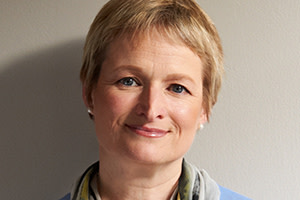
Rita Gunther McGrath, professor of strategy and innovation at Columbia Business School
This year I began digging more deeply into the work of the economist William Lazonick such as the Harvard Business Review article, Profits without Prosperity. He looks at what he calls the “legalised looting of the US industrial corporation” and I found his argument to be very compelling. Since the 1980s, he says, corporations have divided their profits much more towards executives and investors and away from employees, through stock options and stock awards.
The reason I’m so intrigued by this is that we don’t talk about it enough. After the election, for example, people were wringing their hands, saying ‘oh dear, how could this happen?’ But God did not come down and say ‘give money to executives and investors’. As a society, we gave permission for this to happen. We need to talk more about how we did this and we need an institutional counterbalance.
***
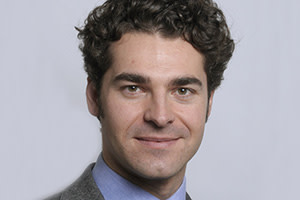
Alberto Alemanno, Jean Monnet professor in EU law and risk regulation, HEC Paris
This year I re-read Nudge: Improving Decisions about Health, Wealth and Happiness by Cass Sunstein and Richard Thaler, first published in 2008 — but still timely. It was very prescient and I recommend to all my students that they re-read it in 2016.
Context matters more than we think, and our individual choices are influenced by factors we can’t see. That can be applied to economics, law, behavioural law or any other field. It’s not the quality of the decision that makes a difference, but the environment within which it is put into practice. So context matters, as the book explains.
A lot of Thaler’s findings have found applications in 2016. After the Trump election, we are examining social media, and how it is conditioning our ability to make informed decisions. Facebook has become a publisher, and because of the “framing effect”context matters more than ever.
***

Pankaj Ghemawat, professor of strategic management, Iese
In areas roughly related to my work, I was really interested in Robert Gordon’s The Rise and Fall of American Growth. I hadn’t really seen the bits of this story pulled together in a narrative arc before. It ends with speculation, which has attracted criticism, but this book is an important antidote to some of the naive optimism about technology. When it talks about what happens to jobs in the age of automation, it also lays out the agenda for what happens next.
Jeff Immelt, CEO of General Electric, came to NYU Stern, where I also teach. He delivered the MBA convocation speech and talked about how the globalisation he had grown up with is not the globalisation we see today — and that there has been a strong change from the notion developed even 10 years ago of the globally connected company.
The globalisation space is getting more complicated — if you look at the DHL global connectedness survey that I produce every year, it is hard to see some great reversal, however. I don’t think you can localise much beyond the marketing, although that does ease relationships with local governments in an era when there may not — given the Brexit and Trump votes — be automatic right of access. The early hype about hyperintegration was overdone: we still have borders.
***
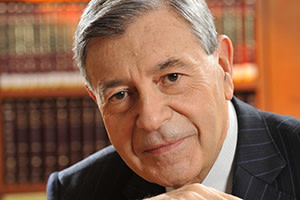
Pedro Nueno, executive president of Ceibs and emeritus professor of entrepreneurship at Iese
Globalisation and digitalisation are two big issues concerning people today, which is why I’ve chosen Winning in Emerging Markets by Krishna Palepu and Tarun Khanna. It’s not a new book — it was published in 2010 — but it’s very good to read to keep you updated, from both a theoretical and a practical point of view.
The book tackles the subject of open innovation, which is very important. We see many companies are not capable of this, so there is a need to change that culture. With some companies, if there is a completely new idea, it can be a threat to management. For example, in pharmaceuticals, which is investing billions in R&D, perhaps an employee sees a solution in biotech. He goes to the boss to tell him they are not going in the right direction, but he is told to focus on his job and not come forward with stupid ideas.
The book makes us ask — are we open to disruptive innovation and ideas that are different to those we are following?
***
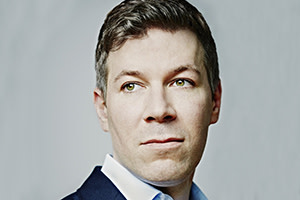
Markus Giesler, associate professor of marketing, Schulich School of Business at York University, Toronto
For the biggest impact this year, I would choose a book by my colleague Jonah Berger, Invisible Influence, which looks at what the world of marketing is doing to affect our everyday behaviour. I like his take on how marketers shape our behaviour as consumers beyond what we are conscious of — we are all studying and thinking about this all the time, but he takes it to a new level.
Another source of transformative insights has been from my own MBA students: this is regular MBAs, not PhDs or industry experts, writing The Big Design Lab’s blog, which is mini case studies of consumer-experience design. These students, my guest contributors, are shedding some new and unorthodox light on things, and it has become a place to go for fresh insights.
My other book recommendation this year would be a classic called What’s the Matter with Kansas?, by Thomas Frank. His case study of his home state sheds light on why working-class Americans have come to vote against their best interests in buying into Republican rhetoric. A wonderful explanatory read to turn to when trying to make sense of these turbulent times of Brexit and Trump.
***

Yoko Ishikura, professor emeritus, Hitotsubashi University
I like The 100-Year Life: Living and Working in an Age of Longevity , by Lynda Gratton and Andrew Scott. I have known Lynda for some time as we work on the Global Future Councils at the World Economic Forum, so I wanted to see what she was up to and I found this book. It’s very good. The ageing population is usually perceived as something negative but she takes a positive view of us, highlighting that our life expectancy is getting longer so there are a lot more things we can now do.
In particular, I am interested by the concept that age doesn’t have to be constrained by the three-stage life of study-work-play. We can design our life in other ways, which is exactly what I have been doing. Right now, for example, I’m freelancing, which is quite difficult to do in Japan — people tend to stay in one place, one job and don’t take risks — but this book has given me the confidence to continue.
I also like the intangible assets referred to in the book, that allow you to keep working for longer, such as vitality assets (health and friendships) and transformational assets (self knowledge, diverse networks and openness to experience). We tend to think about financial assets with ageing but we have these other ones and can keep developing them throughout our life.
***
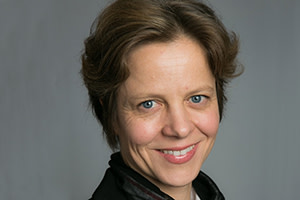
Karin kollenz-Quétard, professor of strategy, Edhec Business School
For me, it’s an article called Increase Your Return on Failure by Julian Birkinshaw and Martine Haas. It is known that big established companies struggle to grow because of a fear of failure — managers become more risk adverse, for example, and so this article shows how not to fear it. It has a simple three-step approach that can be implemented at all levels.
Being based in Europe, fear of failure is something I think we face culturally. In France, for example, if you admit to failure once, lenders will never invest in you. In the US this is not the case. As a professor of strategy, I now encourage all my MBA students to practice failure through simulation tasks, such as selling food on the street.
***
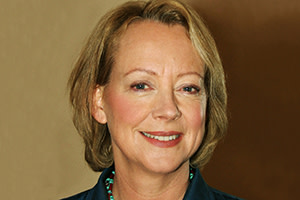
Lynda Gratton, professor of management practice at London Business School
I had to stop myself reading Georges Simenon’s diary, When I was Old, cover to cover after it was reissued this year. I bought a copy in September and took it with me on a whirlwind trip to Japan. When I got back to my hotel after a long day, opening the book was like saying hi to an old friend, though I rationed myself to 10 pages at a time.
I’m a huge fan of Simenon, and I found it fascinating to look into his life — his trips around the world, the issues he struggled with in his own life and in the world around him. As a writer myself, it takes me two years to write a book, yet what stood out for me is that he wrote this in four days. You read about his detailed habits of writing and how he learnt to focus.
It’s good to stand back and think about someone else’s life. The language is so brilliant and he writes in such a sharp way, it’s a pleasure to read.
For more inspiration, here are the Financial Times and McKinsey annual Business Book of the Year awards: the winners, and the shortlisted and longlisted titles.
Interviews by Charlotte Clarke, Miranda Green, Jonathan Moules, Jane Wild and Helen Barrett
Comments